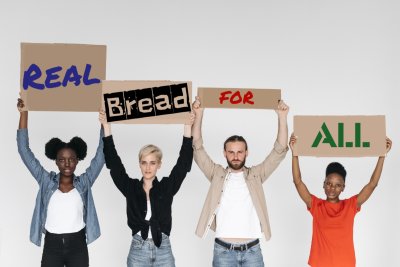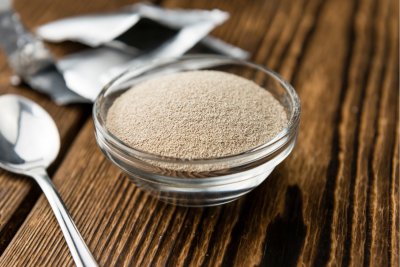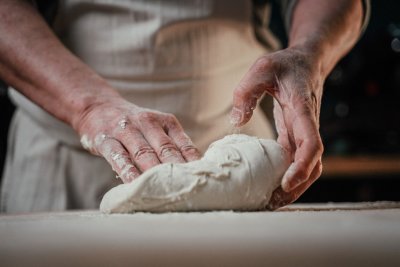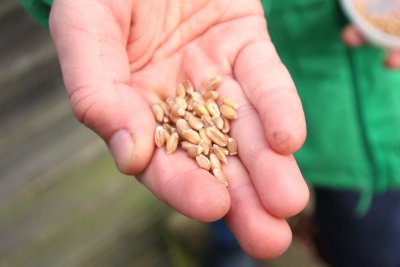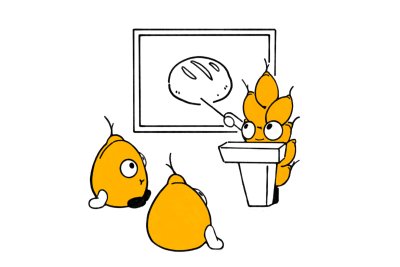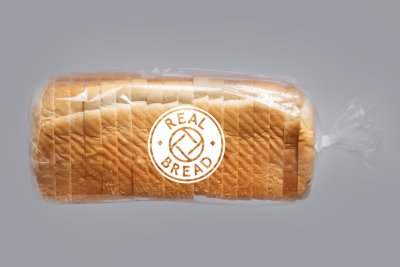Real Bread for All in Hackney and beyond
A FREE, in-person event.
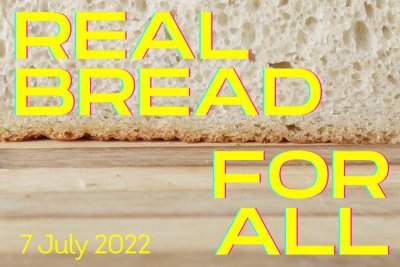
You can see an album of photos from the event, which was attended by around 40 people, on the Real Bread Campaign's Facebook page.
See also: Are you making Real Bread for All?
The event
Thursday 7 July 2022, 6.30pm at e5 Bakehouse.
How do we work to fix the problem that access to delicious, nutritious Real Bread tends to be an ‘us’ and ‘them’ situation, divided along socio-economic lines, including income, class, culture, colour and ethnicity?
How do we convince public sector caterers (and other people) of the nutritional, community and other benefits of Real Bread made by a small, independent, neighbourhood bakery, while exposing the often forgotten/hidden, displaced costs of industrial alternatives?
Who will pay for the shortfall between what it costs a small bakery to make and sell Real Bread, and what people in that community on lower incomes are able to afford?
How do we address other practical and conceptual barriers to access?
Whatever your relationship to these issues (perhaps as a baker, miller, farmer, public sector caterer, community food activist/volunteer, affordable/accessible food advocate, struggling to access/afford Real Bread yourself...) come and join the conversation.
The evening includes a panel discussion, audience Q&A, screening of filmmaker Zev Robinson's Real Bread Bakers, and sourdough pizza fresh from e5's ovens.
Tickets
Entry is free but advance booking essential, with a suggested donation of £15.
There are costs involved in running this event, including paying people to organise and staff it, so please select the contribution you are able and willing to make.
For any queries about the event, please email info@e5bakehouse.com
Everyone is welcome
We want people that these issues affect the most to be part of the conversation. If you are unable to afford £15, please use one of these codes for a 25-100% discount, no questions asked.
When you get to the checkout page, type Bread25, Bread50, Bread75, or Bread100 into the voucher code box.
The conversation
Beyond redistributing surplus loaves via charity/community projects, what can be done to make Real Bread affordable and accessible for people on lower incomes?
How do we balance this with ensuring that small, local, Real Bread bakeries remain economically sustainable and that neither people or their products are undervalued? Who pays to bridge the gap?
This event is designed as a conversation between people involved in making and supplying food, and people in their communities struggling more than ever. Please come prepared to ask questions; present challenges and examples of problems and/or solutions; and (if you are comfortable doing so) sharing your personal experience.
Programme
6.30pm Doors open
7pm Film screening
7.25 Break, with audience invited to consider questions for the discussion
7.35 Panel discussion and audience Q&A
8.45 Pizza served and time for further conversations
The film
In his documentary Real Bread Bakers, Zev portrays the relationship between baking bread, nutrition, community and agriculture. The film presents examples of Real Bread making that aims to close the loop between producer and consumer by redistributing profit share and eliminating the middleman. Questions it asks include: how can a re-localised supply chain be achieved under today’s capitalist system? How do we bring people closer to the source, and how do we make better bread accessible to all?
Zev is a Canadian-British artist and filmmaker who has been making documentaries about food and related issues since 2008 as part of his art, film and food project The Art and Politics of Eating. @zev_robinson
The panel
Lizzie Parle (moderator)
Lizzie has been a sourdough baker since 2017. Previously e5 Bakehouse’s head baker, during her time there she helped lead the Just Bread programme, teaching migrants how to make sourdough. She also put together and taught sourdough workshops for local school children, sharing the joy and simplicity of making and eating delicious bread. In 2021 Lizzie co-founded Curry Club, an organisation formed during the pandemic which provides joyful, nutritious meals cooked by chefs free of charge to people in need. She now lives and works in Paris, baking at Ten Belles. @lizzieparle
Nicole Pisani
[Nicole was unable to attend]
Nicole is a chef who has worked at Yotam Ottolenghi’s Soho restaurant NOPI and Anna Hansen’s The Modern Pantry in London. Within 18 months of working at NOPI, Nicole was promoted to head chef in charge of the kitchen team. It was an incredible learning experience and her love for food was stimulated every day. She gave up that role to engage in helping future generations of children eat well and develop healthy food habits. She co-founded the charity Chefs in Schools to inspire change in school food by freely sharing knowledge of what works well, both in kitchens and classrooms, to schools across the country. She worked closely with Naomi Duncan (CEO) and a great team of hardworking colleagues. @saltbutterbones
Roshni Shah
Plant Futures Programme Manager at Made in Hackney, Roshni began her career in fashion but always had a love for cooking and hosting passed down from her very talented mum. After volunteering as a project leader at Foodcycle and starting her own plant-based supper club, she noticed a disconnect in values between her work and extracurricular life. So, in an effort to seek more purpose, she transitioned to the third sector through the On Purpose Programme. Since then she has worked in tech for good and various community organisations.
She is passionate about promoting equality, diversity and community building and volunteers for organisations that reflect these values; currently Newington Green Alliance, The Girls Network and the Women’s Equality Party. At Made in Hackney, Roshni has found an organisation that truly lives their values, and combines her love for plant-based food and community building. @roshpics
Sarena Shetty
Sarena is a programme designer at Participatory City Foundation working on the Every One Every Day project based in Barking and Dagenham, helping to build a fully inclusive Participatory Ecosystem in the borough.
Her role involves developing a range of inclusive participation opportunities that build capacity amongst residents by designing programmes, partnerships and support systems across the borough. Alongside this she's working to develop the concept of collaborative businesses - ways to do business that are better for both people and the planet.
Before Participatory City she was a Year Here fellow specialising in community resilience, working on projects around social isolation and loneliness, particularly for older people. She's focussed on building stronger more connected communities that leave no one behind. @ParticipatoryC
Chris Young
Chris has coordinated the Real Bread Campaign since March 2009. His work involves running the Campaign’s international supporter network, creating and running initiatives including Sourdough September, Real Bread Week, Together We Rise (therapeutic/social baking), calling for an Honest Crust Act of better loaf labelling and marketing laws, and No Loaf Lost (surplus and waste reduction), as well as the Lessons in Loaf and Bake Your Lawn programmes for schools. He’s the author of the Slow Dough: Real Bread recipe book and Knead to Know…more microbakery handbook, plus numerous bready reports, and editor of True Loaf magazine.
In 2022, Chris began work on Real Bread For All, a renewed focus on how Real Bread can be made more affordable and accessible to more people. @RealBreadCampaign
Background
Wheat is a global staple. Bread is a table companion for and from people across different contexts regardless of class, ethnic and economic background.
The expanding industrialisation of wheat production, and consequent decrease of grain prices, has made this product readily available and accessible. A cheap and satisfying source of calories.
Unfortunately, as a consequence of these processes, the quality has severely deteriorated. Many questions hang over the increasing use of chemical inputs in agricultural production, the development of hybrid seeds, the dominant flour milling and ‘refining’ processes and ‘no time’ industrial loaf fabrication.
Have these factors combined to make products that are not only less nutritious for all but also problematic for some? Is the increasing prevalence of coeliac disease, wheat allergy and gluten intolerance a warning that is not being heeded?
Such questions have prompted a growing Real Bread movement and the Real Bread Campaign. People in the movement variously practice and promote the selection of grain varieties based on not just yield and protein levels; sustainable farming practices; milling that preserves flavour and nutritional values; and long fermentation. Typically, this goes hand in hand with the central role of skilled, knowledgeable food producers, and a relocalisation that helps to strengthen communities and their economies.
Problematically, however, alternatives to commodity grain, flour and baked products tend to be unaffordable or otherwise inaccessible to people on low or no income. Real Bread has become a marker of privilege, not only for people with enough money to buy it but also for people who are able to spare time to make it.
Published Thursday 26 May 2022
Real Bread Campaign: The Real Bread Campaign finds and shares ways to make bread better for us, better for our communities and better for the planet. Whether your interest is local food, community-focussed small enterprises, honest labelling, therapeutic baking, or simply tasty toast, everyone is invited to become a Campaign supporter.
